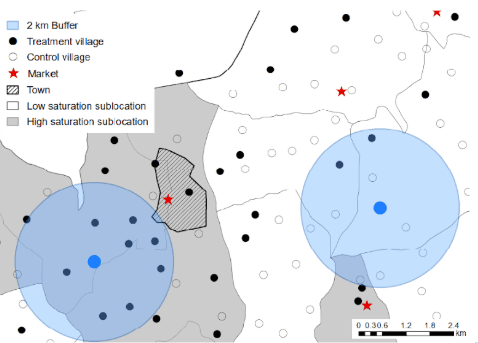Summary of findings 2 years in: Here’s a 3 minute audio summary of the findings from NPR: To learn about the most effective ways of delivering cash aid, GiveDirectly worked with a team of researchers to compare three ways of giving out funds.1 About 200 Kenyan villages were assigned to one of three groups and […]
Blog - Research
Candid thoughts from staff, donors, and recipients on our work and the broader movement towards cash transfers.
Recipients, Research
For refugees in cities, large cash transfers support self-reliance
For families fleeing conflict or crisis, the world is short on solutions. In the past decade, relief organizations have been forced to make steep cuts to rations provided due to budget constraints, while wealthy countries have welcomed fewer than 1% of refugees. For the 33M refugees unable to return home, building a new life in […]
Recipients, Research
Evidence on how cash transfers empower women in poverty
Donations to GiveDirectly put power in the hands of recipients, 62% of whom are women.1 On International Women’s Day, hear directly from women and girls in poverty in Malawi about the unique ways that direct cash empowers them: This impact is more than anecdotal; research finds that cash aid lets women improve their lives in […]
Research
Research on our U.S. COVID-19 program found little measurable impact. We’re adapting.
Between March 2020 and October 2021, GiveDirectly distributed $1,000 one-time relief payments to nearly 200,000 low-income households as part Project100, the largest privately funded cash transfer program in U.S. history. Researchers at University of Michigan ran two randomized controlled trials to evaluate this program, focusing on the impact on recipients’ material and mental well-being. The […]
Recipients, Research
We asked people in poverty how they prefer to receive money
In the past two years, 182 countries launched cash aid programs, recognizing the autonomy they provide people in poverty to make decisions for themselves. In many cases, however, aid recipients have limited control over exactly how they get their cash transfers. While the total amount might be fixed, the frequency and size of payments and the […]
Research
Study: refugees build independence with cash aid
Worldwide, over 26M people have fled their country of birth and today live as refugees, often in conditions of insecurity and deprivation. Despite hundreds of studies showing the positive impact of direct cash aid on people in poverty, only a few focused on refugees (1, 2) and no large experimental study had been conducted on […]
Research
What we’ve learned by comparing cash to job training
How does spending funds on training young people compare to handing them the cash instead? Today we released the initial study results.
Research
How does a basic income affect recipients during COVID-19?
Initial results from our basic income experiment were released today. In the working paper’s abstract, researchers Abhijit Banerjee, Michael Faye, the late Alan Krueger, Paul Niehaus, and Tavneet Suri wrote: “We examine some effects of Universal Basic Income (UBI) during the COVID-19 pandemic using a large-scale experiment in rural Kenya. Transfers significantly improved well-being on […]
Research
New research results: How do cash transfers impact the people who don’t receive them?
In 2014, GiveDirectly partnered with academic researchers to launch our largest study ever in Kenya. The ultimate goal: find out how cash transfers affect local economies, including nearby non-recipients, enterprises and markets. Now, in 2019, the results of this research have been released.
Research
What’s the best way to help the people who supply the things we buy every day?
Our latest research in 4 sentences: Over the course of 3 payments in 4 months, GiveDirectly delivered $1,000 to 3,415 households in coffee growing communities. One year later, we surveyed them to measure their economic well-being and coffee production. Recipients of the cash consumed more, earned more, had more assets, and greater food security. Also, coffee […]

